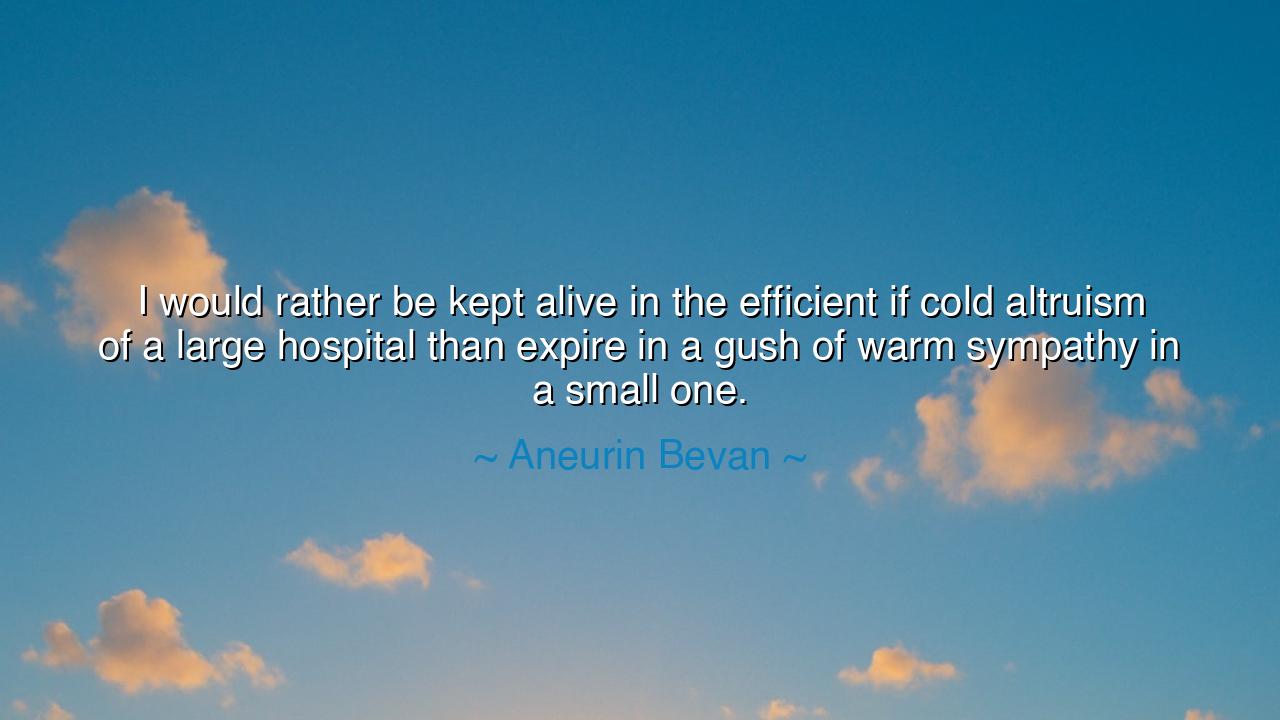
I would rather be kept alive in the efficient if cold altruism
I would rather be kept alive in the efficient if cold altruism of a large hospital than expire in a gush of warm sympathy in a small one.






Hear the resolute words of Aneurin Bevan, architect of Britain’s National Health Service and tireless champion of the people, who declared: “I would rather be kept alive in the efficient if cold altruism of a large hospital than expire in a gush of warm sympathy in a small one.” In this saying, Bevan does not despise compassion, but he sets forth a truth as sharp as steel: when life itself hangs in the balance, it is not sentiment that saves us, but skill, organization, and the steady hand of a system built for healing.
The meaning of this quote lies in the distinction between efficiency and sympathy. A small hospital may surround the dying with kindness, but without the tools, the knowledge, or the structure to save, its tenderness is powerless. By contrast, a large hospital, though it may feel cold, operates with altruism expressed not in words but in deeds: trained doctors, advanced equipment, and the capacity to preserve life. Bevan’s point is clear—true compassion is not merely an emotion, but the creation of a system that gives all people the chance to live.
This conviction was born from Bevan’s own life. Raised in the coalfields of Wales, he saw poverty and sickness consume his community, where miners often perished not for lack of love, but for lack of medicine. From these sorrows grew his resolve: that health should not depend on wealth, and that hospitals should not be measured by their warmth of sentiment but by their power to heal. Thus was born the National Health Service in 1948, a temple of collective altruism, where skill and efficiency stood as the highest form of compassion.
The ancients, too, spoke of this paradox. Consider the words of Aristotle, who taught that virtue is not mere feeling but right action. To wish well is not enough; one must do well. Likewise, Bevan proclaims that warm sympathy, if it cannot act, becomes a hollow offering. It is better to be saved by the cold altruism of strangers working in concert than to die comforted by friends who lack the means to help. For in the end, love that acts through structure, discipline, and knowledge is greater than love that remains only in feeling.
History gives us another mirror in the story of Florence Nightingale. During the Crimean War, she found hospitals filled with warmth but devoid of order. Soldiers died in droves not from lack of care, but from lack of sanitation, organization, and skill. She transformed these hospitals into places of discipline and efficiency, reducing mortality not with sympathy alone, but with science and structure. Her legacy, like Bevan’s, was to remind humanity that compassion must be harnessed to knowledge if it is to save lives.
The lesson for us is that good intentions are not enough. Whether in medicine, in leadership, or in daily life, it is better to build systems of true aid than to rely only on the warmth of feeling. To feed the hungry, we must organize the harvest. To heal the sick, we must train the healer. To lift the poor, we must structure society so that dignity is protected. Sympathy without power is fleeting; efficiency, though it may appear cold, is often the truest form of love.
Practical action follows: in your own life, do not stop at words of comfort. Offer them, yes, but go further. If a friend is hungry, do not only say you care—bring bread. If the sick are near, do not only weep—help them find a doctor, support the structures that sustain them. In your community, advocate for systems—schools, hospitals, networks of care—that embody altruism not as feeling alone, but as enduring action.
So let Bevan’s words echo as both challenge and guide. Better to live in the efficient cold altruism of a system that saves, than to die surrounded only by warm sympathy that cannot act. For in the end, the greatest love is not sentiment but service, not words but deeds, not the fleeting gush of comfort, but the enduring framework that allows all men and women to live, and to live with dignity.






AAdministratorAdministrator
Welcome, honored guests. Please leave a comment, we will respond soon